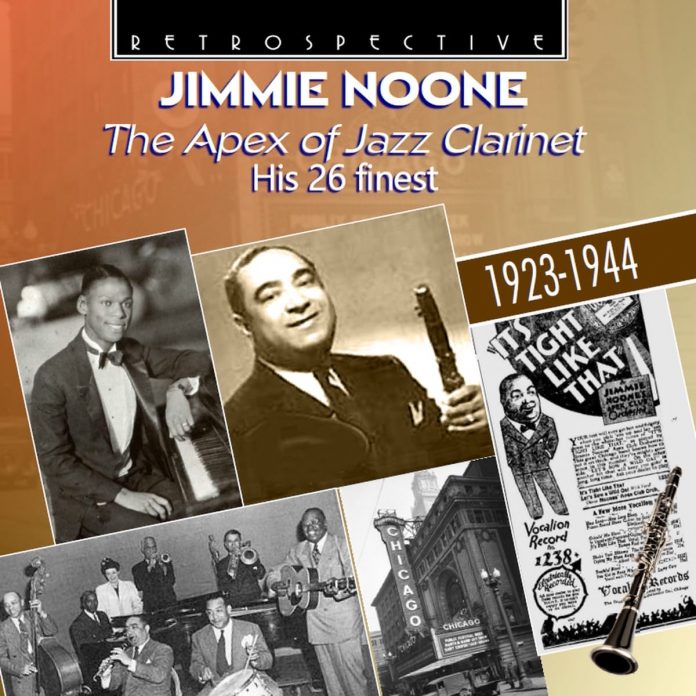While Jimmie Noone belonged in the upper echelons of the New Orleans clarinet dynasty and might have seemed sophisticated in comparison with, say, Johnny Dodds, he was in fact a much less effective player than either Dodds or, of course, Bechet. His penchant for weak show tunes let him down, and the market he was hoping to reach is a mystery. Having said that, 90% of his best work is on this CD, and it includes many classic performances as well as several rare appearances by good sidemen that are to be savoured.
The earlier tracks, whilst they drew proper attention to Jimmie for the first time, are the least rewarding, having an unimaginative and po-faced quality, which began to ebb when Poston was augmented and finally replaced as his front-line partner. That is not to deny many good moments from Jimmie and Hines, but I find the post-1930 things much more rewarding, and entirely competitive with the embryo mainstream (Kirby and Co.) that surrounded them.
The chugging I Know has no doubt been moved to first place because of its incredibly dexterous (for 1928) clarinet. Noone already soars with much more grace than Dodds was capable of. The 1923 Play That Thing is a fine blues of great clarity, with the two cornets impressive before Jimmy (on his first recording) plays fully and mature blues with an eloquence that pre-dated the later grace of Bigard and Co. There’s more good cornet from Keppard on Tomale.
Track 9 introduces the performances that made Jimmie’s name. We snapped up the two-sided Vocalion 78 of My Daddy for the outrageously bawdy lyrics. A couple of tracks later we get to the fruits of Noone’s genius with three of his tracks from January 1936 with a wonderful cast of new stars including Francis Whitby, a supremely gifted tenor player ahead of his time and in the Hawk/Chu class. Guy Kelly was better known and is very tasteful, and Jimmie plays one of his finest solos on Blues Jumped A Rabbit. I don’t think any group could have beaten the pure mainstream of the Shavers, Brown and Bunn lot.
Four Or Five Times, with its feisty Spencer vocal, is the best version I know of, and these two later sessions raise the disc to its four stars. Plus of course the magnificent attempt at a New Orleans ensemble introducing Preston Jackson with excellent Lonnie and Noone on Hop Scop.
Discography
(1) I Know That You Know; (2) Play That Thing; (3) Here Comes The Hot Tamale Man; (4) Four Or Five Times; Every Evening I Miss You; (5) Apex Blues; A Monday Date; Blues My Naughty Sweetie Gives To Me; (6) Oh, Sister, Ain’t That Hot?; Sweet Lorraine; King Joe; (7) It’s Tight Like That; (8) Chicago Rhythm; (9) I Got A Misery; (10) My Daddy Rocks Me; (11) San; (12) Delta Bound; (13) ’Way Down Yonder In New Orleans; The Blues Jumped A Rabbit; Sweet Georgia Brown; (14) Bump It (Apex Blues); I Know That You Know; Japansy; (15) New Orleans Hop Scop Blues;(16) Clambake In B Flat; (17) High Society (79.40)
Noone (cl) with:
(1) His Apex Club Orchestra: Joe Poston (as); Earl Hines (p); Bud Scott (g, bj); Johnny Wells (d). Chicago, 16 May 1928.
(2) Ollie Powers & His Harmony Syncopators: Tommy Ladnier, Alex Calimese (c); Eddie Vincent (tb); Horace Diemer (as); Glover Compton (p); John Basley (bj); Bass Moore (tu); Ollie Powers (d). Chicago, September 1923.
(3) Cookie’s Gingersnaps: Doc Cook (ldr); Freddie Keppard (c); Fred Garland (tb); Joe Poston (as); Kenneth Anderson (p); Johnny St Cyr (bj). Chicago, 22 June 1926.
(4) as (1), Chicago, 16 May 1928.
(5) as (4) plus Lawson Buford (tu). 23 August 1928.
(6) as (5). Chicago, 26 August 1928.
(7) George Mitchell (c); Fayette Williams (tb); Joe Poston (as, v); Alex Hill (p); Junie Cobb (g, bj, v); Bill Newton (tu); Johnny Wells (d). Chicago, 27 December 1928.
(8) Mitchell and Williams out. Chicago, 26 February 1929.
(9) as (8). Chicago, 2 March, 1929.
(10) Zinky Cohn (p) replaces Hill. May Alix (v). Chicago, 11 July 1929.
(11) Eddie Pollack (as); Zinky Cohn (p); Wilbur Garham (g, bj); Bill Newton (tu); Johnny Wells (d). Chicago, 1 July 1930.
(12) John Henley (g, bj) replaces Gorham, Quinn Wilson (tu) replaces Newton; Benny Washington (d) replaces Wells. Chicago, 15 December 1933.
(13) His New Orleans Band: Guy Kelly (t, v); Preston Jackson (tb); Francis Whitby (ts); Gideon Honore (p); Israel Crosby (b); Tubby Hall (d). Chicago, 15 January 1936.
(14) His Orchestra: Charlie Shavers (t); Pete Brown (as); Frank Smith (p); Teddy Bunn (g); Wellman Braud (b); O’Neil Spencer (d, v). NYC, 1 December 1937.
(15) Natty Dominique (t); Preston Jackson (tb); Richard M Jones (p); Lonnie Johnson (g); John Lindsay (b); Tubby Hall (d). Chicago, 5 June 1940.
(16) The Capitol Jazzmen: Billy May (tp); Jack Teagarden (tb); Dave Matthews (ts); Dave Barbour (g); Artie Shapiro (b); Zutty Singleton (d), Los Angeles, 16 November 1943.
(17) Kid Ory New Orleans Band: Mutt Carey (t); Kid Ory (tb); Buster Wilson (p); Bud Scott (g); Ed Garland (b); Zutty Singleton (d). Los Angeles, 15 March 1944.
Retrospective RTR 4379
















